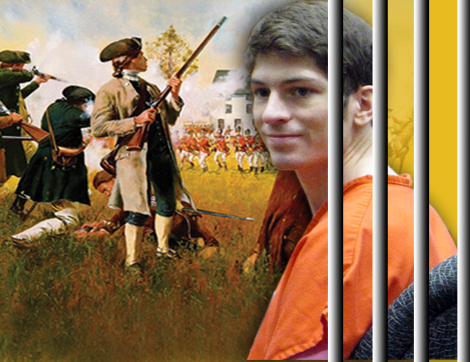
By Pete Papaherakles
Francis August Schaeffer Cox, leader of the Alaska Peacekeeper Militia (APM), was sentenced on January 8 to a staggering 26 years in prison after he was accused of plotting to kill government employees. But those who know the 28-year-old believe he is a good patriot who has been railroaded by the Federal Bureau of Investigation (FBI) and federal prosecutors because of his outspoken beliefs and opposition to tyranny.
“I put myself here, with my own words, and I feel horrible about that, and I hurt my family, and that’s who’s really paying,” he said at a hearing in federal court in Anchorage.
Cox, who proclaimed that “God’s law” trumps “man’s law,” was convicted last summer of conspiring to murder federal and state government officials, including judges and law enforcement agents, soliciting others to commit murder and related weapons charges. Evidence included a cache of illegal weapons, detailed lists of potential targets, testimony of government informants and tape recordings of speeches and meetings, some made secretly. Cox’s sentence came a day after another member of the APM, 57-year-old Lonnie Vernon, received the same sentence.
During the trial, Cox spent two days on the witness stand, at times confidently telling the jury his philosophy and likening himself to civil rights leader Martin Luther King Jr. and Mahatma Gandhi. He testified that he sincerely believed government agents were planning to kill him and that he was justified in taking steps to defend his family against the police.
But at his sentencing, Cox disavowed many of those stances. He and his attorney cited a post-trial psychological evaluation that concluded Cox was suffering from several disorders including paranoid schizophrenia, delusions and a paranoid personality disorder. United States District Court Judge Robert Bryan, who imposed the sentence, said he agreed Cox probably was mentally ill but said that did not excuse his actions. Bryan’s own “diagnosis” included paranoia, grandiosity, narcissism, egocentricity and pathological lying.
When this writer met Cox at a conference in Montana in the spring of 2010, Cox appeared to be an intelligent, charismatic young man. He was full of life and patriotism. Cox, who had openly declared himself to be a ”sovereign citizen,”was a gifted orator who spread his philosophy of limited government to anyone who would listen. Government was tyrannical and corrupt, he said.
Because Cox believed government agents wanted him dead, he reportedly had taken steps to make sure that didn’t happen. He regularly wore a bulletproof vest. He armed himself and surrounded himself with loyal armed militia members. In that context, paranoia is not a disorder but a survival instinct.
Neither Cox nor his followers were accused of actually harming other people. But they did speak about their willingness to kill in the service of Cox’s worldview or to prevent his capture. And they took steps to arm themselves in the event of a bloody confrontation. They also developed plans by which to carry out their resistance. They made provocative statements perceived as threatening to judges, law enforcement and other federal employees, like Transportation Security Administration and Department of Homeland Security agents.
Cox came to the attention of the FBI in late 2009 after speeches in Montana that claimed the Fairbanks militia had 3,500 members and was armed with mines and other military weapons. In reality, the group only had about a dozen members and never trained for military duty.
As the investigation unfolded over more than a year, the FBI eventually used a paid informant to infiltrate the group. He recorded more than 100 hours of conversations.
Cox’s attorney, Nelson Traverso, claimed during the trial that the case was an overreach by prosecutors and an attempt to silence Cox’s protected speech while assistant U.S. Attorney Steven Skrocki argued that Cox had crossed the line from offhand comments to formulating plans to kill people.
Cox’s sentencing is the conclusion of a high-profile case that brought Alaska into the spotlight for its home-grown band of would-be militiamen with sovereign-citizen leanings, groups of which from around the nation had come under the intensified scrutiny of the FBI. The promise of a re-election bid by Democratic President Barack Obama only heightened tensions and a growing sense of peril. Such “extremists,” the FBI had warned, were becoming a top “domestic-terrorism” threat.
Cox said he is appealing both his conviction and his sentence with the Ninth U.S. Circuit Court of Appeals. The appeals court has accepted the filing and has set a due date for the brief in April.
Peter Papaherakles, a U.S. citizen since 1986, was born in Greece. He is AFP’s outreach director. If you would like to see AFP speakers at your rally, contact Pete at 202-544-5977.

